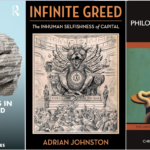News – October 2023
20% off and free global shipping on all Routledge titles for LacanOnline.com readers. Use this link and code S031 at the checkout.
Beginning with new books, Betty Milan’s Analyzed by Lacan: A Personal Account has just been published by Bloomsbury. Her book contains two main texts: a memoir of her analysis with Lacan in the 1970s, Why Lacan, and her play Goodbye Doctor which was inspired by this experience. An interview with Milan by the late Mari Ruti is also included here. Milan’s story, and in particular the play, have recently been adapted into the movie Adieu Lacan by Richard C. Ledes. An interview with Ledes, by psychoanalyst Chris Vanderwees – who along with Cliff Landers translates this new book – was published in the latest issue of the journal ‘Psychoanalysis, Culture & Society’ and can be read free online here.
Darian Leader’s latest, Is It Ever Just Sex?, has also just been released at the start of November. Asking the question of what we are really thinking about when we are thinking about sex – and what we are doing when we do it – Leader’s book responds with an exploration of phantasy, anxiety, guilt, revenge, violence, and love. Both accessible and enlightening, Leader draws on clinical experience, case studies and historical research to interrogate the nature of sex from a psychoanalytic perspective.
Released in the past month from the Palgrave Lacan Series is Mark Murphy’s The Direction of Desire: John of the Cross, Jacques Lacan and the Contemporary Understanding of Spiritual Direction. Examining Lacan’s theory of the four discourses alongside mystic writings, whose teaching is so important in the Catholic spiritual tradition, Murphy proposes that Lacan and John of the Cross have a common concern with “reinvigorating spiritual direction.” Against what he labels a “positive affective experientialism,” Murphy finds in Lacan’s work a more radical notion of desire , one which is not therapy-focused in how a relationship to God is measured.
Out in the next couple of weeks is Shirley Zisser’s The Linguistic Turn of the English Renaissance: A Lacanian Perspective. Zisser looks at four cultural “symptoms” of the English Renaissance: “the paucity of painting, the interest in rhetoric, the emergence of a literary style focusing on form and a fascination with the myth of Orpheus.” What is of interest for psychoanalysis among these inter-related aspects is the intrication of knowledge and flesh, which this book explores.
Also due out in mid-November, Mark Kinet’s The Spirit of the Drive in Neuropsychoanalysis offers a concise introduction to the basics of neuropsychoanalysis, both theoretically and clinically. Drawing on the work of Mark Solms and Ariane Bazan, whose own fidelity is to Freudian and Lacanian research programmes, Kinet offers clinical vignettes to illustrate a neuropsychoanalytical approach to topics such as the unconscious, homeostasis, affect, pleasure and the drive. This title is part of the Routledge Neuropsychoanalysis Series.
Relatedly, newly-announced by Routledge is The Unconscious in Neuroscience and Psychoanalysis: On Lacan and Freud, by Marco Máximo Balzarini, which is due out in April. The work of recent researchers such as Mark Solms, Francois Ansermet and Pierre Magistretti is examined in the context of the supposed dichotomy between neuroscience and psychoanalysis, and the heritage of Freud’s project to describe the unconscious. Balzarini is Professor of Psychoanalysis at the Universidad Nacional de Córdoba, Argentina.
Among events, on Sat Nov 4th Stephanie Swales, Andrea Fassolas, and Derek Hook will be speaking at Psychoanalysis and the Prison System, online via Zoom, hosted by the Guild of Psychotherapists. For those who cannot join, ticket holders will receive a link to the recording afterwards. This is the latest in the Psychoanalysis at the Margins series from the Guild, looking at psychoanalytic work with groups and practices traditionally considered at the margins of psychoanalysis. Three great speakers from both sides of the Atlantic will bring insights from their clinical and theoretical experience to this exciting event on an important topic. Book here.
On Sun Nov 5th Lacanian Compass will be holding its second videoconference of the series towards the Clinical Studies Days 16, with ‘Transference and Interpretation in Lacan’s Later Teaching’, with guest speaker Jean Luc Monnier. The seminar is free and open to all participants. More details on the series and LC’s other events here.
For those in London, on Sat 11th Nov Domenico Cosenza – author of A Lacanian Reading of Anorexia, which was published over the summer – will speak at the London Society of the NLS on ‘Anorexia and the Gaze’, in conversation with Susana Huler. Can anorexia be treated by a classical psychoanalytic orientation? How can Lacanian concepts such as ‘refusal’ and ‘the object nothing’ help us direct the treatment? Further details on the London Society’s programme is available on their site.
Registrations are now open for the NLS Congress 2024 on ‘Clinic of the Gaze’, to be held in Dublin 11th-12th May. The presentation of the theme by Daniel Roy, translated into several languages, is available on the NLS site. A conference blog and pre-read material will be available shortly.
On YouTube, Dr Sinan Richards’ presentation on Solange Faladé’s Lacanian theory of race, given at the end of September for Lacan in Scotland, is now available. Faladé (1925-2004) was a close friend and disciple of Lacan. A French-Beninois doctor, anthropologist and psychoanalyst she was also the first woman Franco-African psychoanalyst in France, and founded her own psychoanalytical society, l’École freudienne, in 1983. Richards’ talk focuses on the crossover between Faladé’s orthodox Lacanianism and her radical anti-colonial scholarship. A Q&A with the audience follows the talk.
Lastly, the Sydney Lacan Study and Reading Network offers a series of texts providing commentaries on Lacan’s Seminars from its monthly seminar programme. Here is a sample of Dr Ehsan Azari Stanizai’s October seminar, following Seminar V, on ‘Aetiological Vignettes of Obsessional and Hysterical Desire’, the full version of which can be found here.
Got news? Get in touch.




Leave a Reply